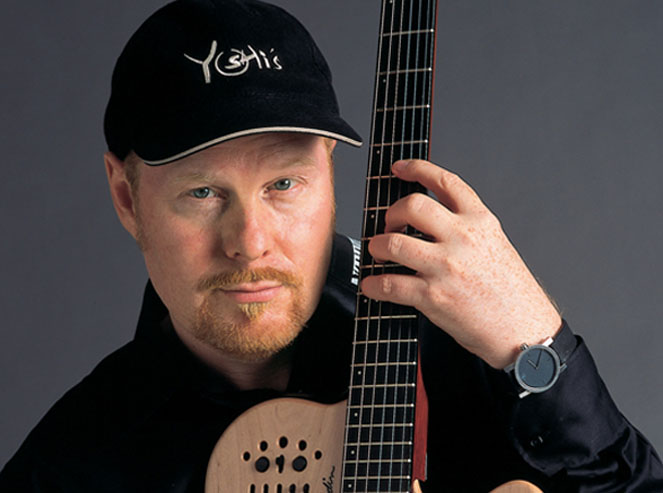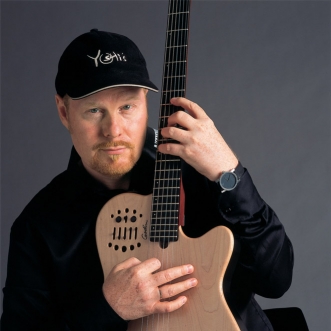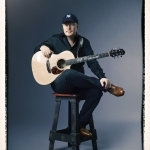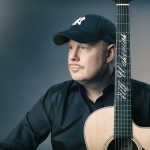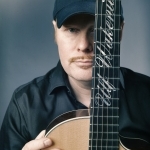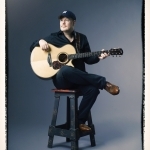jazz
Ulf Wakenius

Présentation du spectacle
Plusieurs spectacles en tournée
Duo avec Martin Taylor
Duo avec Paulo Morello
Trio avec Dan Berglund et Magnus Östrtöm " Taste of honey " - Album aout 2020 chez ACT
Avec la sortie de son dernier album, Taste of Honey, chez ACT en aout dernier, le guitariste suédois rend un hommage singulier et très personnel à Sir Paul McCartney.
Pour cette nouvelle tournée, il s’entoure d’une dream team suédoise avec Dan Berglund à la contrebasse et Magnus Östrom à la batterie.
Quartet avec Philip Catherine (guitare) - Gregory Hutchinson (batterie) - Chris Jennings (contrebasse)
Nouvel album février 2023 chez ACT
Duo guitares avec Martin Taylor " Legacy "
Ils puisent dans leur expérience, assez unique sur la scène jazz européenne, auprès de Stephane Grappelli et Oscar Peterson que ce soit sur scène ou en studio.
Pendant 11 ans Martin Taylor a comblé le vide laissé par Django Reinhardt aux côtés de Stephane Grappelli, quant à Ulf Wakenius, il travailla 10 ans avec Oscar Peterson, succédant à Joe Pass, Herb Ellis et Barney Kessel.
De plus, Taylor et Wakenius ont collaboré avec les meilleurs comme Pat Metheny, Herbie Hancock, Jeff Beck, George Harrison, Michael Brecker, Jamie Cullum, Ray Brown et Michel Legrand pour n’en citer que quelques-uns.
Biographie
Le guitariste vagabond…
Le guitariste suédois Ulf Wakenius s'inscrit au firmament des guitaristes de jazz d’aujourd'hui.
Il a joué et/ou enregistré avec les plus grands : Herbie Hancock, Pat Metheny, Michael Brecker, Jack DeJohnette, Jim Hall, Ray Brown, Michel Legrand... Il a aussi été le dernier guitariste du quartet d’Oscar Peterson qu’il a accompagné pendant 10 ans. Avec ce dernier, il a visité le monde entier et a joué sur les scènes les plus prestigieuses comme le Carnegie Hall, le Hollywood Bowl, le Chicago Symphony Hall, le Wiener Konzerthaus ou le Palais des Congrès. Clint Eastwood les a filmés à Monterey lors de la réalisation d’un documentaire sur le festival.
Depuis 2008, il est le partenaire privilégié de Youn Sun Nah, en disque comme en concert. Ensemble ils ont joué un peu partout dans le monde en duo et en quartet (Marciac, Montréal, Bourges, San Sebastian, Lugano…).
Le dernier album d’Ulf Wakenius intitulé « Vagabond » est sorti au début de l’année 2012 sur le label allemand ACT. Ce projet tourne depuis en solo, en duo avec l’accordéoniste Vincent Peirani et avec son quartet nordique composé de Lars Jansson (Jan Garbarek Group), Jesper Bodilsen (Stefano Bollani trio) et Paul Svanberg.
Biographie longue
Ulf Wakenius a tenu pendant 10 ans, entre 1997 et 2007, l'une des places les plus prestigieuses pour un jazzman, comme guitariste du légendaire quartet d'Oscar >Peterson. Ses prédécesseurs furent aussi fabuleux que Barney Kessel, Herb >Ellis et Joe Pass.
Il a accompagné le pianiste un peu partout dans le monde dans des endroits aussi renommés que le Carnegie Hall, Hollywood Bowl, Blue Note, et avant la disparition d'Oscar Peterson, à guichets fermés au Royal Albert Hall, Chicago Symphony Hall, Palais des Congrès, Wiener Konzerthaus, Massey Hall, Teatro Colon-Buenos Aires, Stravinski Hall-Montreaux et Tokyo International Forum Hall.
Son concert avec Oscar Peterson au Festival de Monterey 2006 a été filmé par Clint Eastwood.
En 2003, il a formé un superbe duo avec Pat Metheny au Baltica Jazz en Allemagne, un concert diffusé en direct sur la télévision allemande. Sa dernière sortie d'album était un hommage à la musique d'E.S.T (Love is real, ACT 2008), enregistré quelques mois avant la disparition d'Esbjorn Svensson.
Quelque temps auparavant, il avait publié Notes from the Heart (ACT, 2005), jouant la musique de Keith Jarret à la guitare. Il a joué et enregistré avec le who's who du monde du jazz . Deux albums pour le label Terlac avec le grand contrabasiste Ray Brown : Seven steps to heaven qui est devenu numéro un dans les charts US, et Summertime, qui a été élu l'un des dix meilleurs albums de l'année 1998 aux Etats-Unis. Il est aussi parti en tournée avec ses propres groupes en invitant Mike Brecker, Ray Brown, Joey Calderazzo.
Le commencement
Ulf Wakenius est né à Halmstad en Suède le 16 avril 1958. Il commence par jouer de la guitare à l'âge de 11 ans, inspiré par d'autres guitaristes dans le voisinage de la nouvelle ville qu'il habite : Göteborg.
Après avoir commencé la guitare il ne s'est plus jamais arrêté. Au départ, il est inspiré par les virtuoses du blues électrique mais il se tourne rapidement vers une orientation plus jazz. John Mc Laughlin devient son nouveau héros. (John Mc Laughlin écrira plus tard quelques lignes pour l'un de ses albums en solo).
A l'âge de 17 ans, Ulf Wakenius est déjà bien installé comme musicien de jazz jouant dans divers groupes suédois. Durant les années qui suivent il fait plusieurs tournées européennes. Au début des années 80, il fonde le duo Guitars Unlimited avec Peter Almqvist. Ils font des tournées dans le monde et des apparitions fréquentes à la télévision suédoise. Le pic de leur >carrière est un concert au Melody Grand Prix 1985, un évènement historique regardé par 600 millions de personnes (probablement l'audience la plus large qu'un duo de jazz n'est jamais eu).
Dans le milieu des années 80, Ulf Wakenius a l'opportunité d'enregistrer un album solo à Rio de Janeiro au Brésil. Il a la chance de pouvoir réunir des musiciens de talents tels que Sivuca, Luizao, Paolo Braga (Elis Regina), Nico Assumpcao (Milton Nascimento), entre autres. L'enregistrement devient un hit en Suède avec une diffusion considérable. Cette aventure est le début d'une grande histoire d'amour avec la culture brésilienne. Plus tard il retournera au Brésil avec Oscar Peterson pour jouer devant 35 000 personnes à Sao Paolo.
A la fin des années 80 Ulf Wakenius commence à jouer avec le contrebassiste danois Niels Henning Orsted Pedersen. Leur collaboration est très fructueuse, avec des concerts à travers le monde, plusieurs enregistrements. Ils jouent même pour le président des Etats-Unis de l'époque, Bill Clinton, et de nombreuses émissions de télévision.
Au début des années 90 Ulf travaille sur divers projets avec des musiciens américains et européens de premier plan. Il participe au groupe Graffiti formé avec la section rythmique de John Scofield : Dennis Chambers, Gary Grainger Haakon Graf. Ils font des tournées aux USA et en Europe et enregistre un CD très bien accueilli. Il commence aussi une collaboration avec l'icône de la contrebasse Ray Brown.
Ulf Wakenius a enregistré 10 albums en tant que leader et de nombreux albums comme accompagnateur avec des légendes du jazz.
Extraits de presse
« Génie suédois de la guitare » Downbeat
« Virtuose aussi délicat qu'enflammé » Michel Contat-Télérama
" Wakenius est l'un des plus imaginatifs interprètes du jazz contemporain » All About Jazz
« Son approche de la guitare ne peut être qu’admirée, il en joue comme s’il était né avec » John McLaughlin
« Tout simplement génial! » Pat Metheny
« Il est le plus grand pour moi! » Oscar Peterson
Discographie
Discographie sélective :
Father and Son (ACT) - avril 2017
Momento Magico (ACT) - mars 2014
Vagabond (ACT) - 2012
Signature Edition (ACT) avec Jack DeJohnette, Randy Brecker… - 2010
Love is real (ACT) - 2008
Forever You (Stunt) - 2007
Notes From The Heart (ACT) - 2006
Enchanted Moments(Dragon) - 1996
Dossier presse
Télécharger la presse
"Swedish Guitar Genius" - Downbeat
"Superb European artist" - Los Angeles Times
" With the Signature Edition 2(ACT), Wakenius is positioned as one of contemporary jazz`s most imaginative
intepreters" - All About Jazz
"Wakenius gives the melodies a clarity sometimes obscured in the original versions.Lovely!" - BBC
"Ulf Wakenius played gorgeus liquid solos at Carnegie Hall" - New York Times
Quotes from Guitar Greats :
"He plays the guitar like he was born with it already in his hands" - John McLaughlin
..."Just great!" - Pat Metheny
"So you are the badboy everybodys talking about" - Larry Carlton
"YOU are an amazing guitar player!” -Steve Lukather
"Spectacular! Unbelieveable! - Allan Holdsworth
"I love your playing!" - John Scofield
"Humongous chops" - Pat Martino
Anouar Brahem English Page
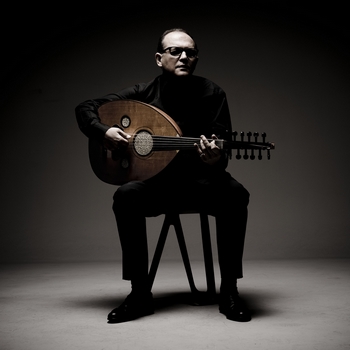
Anouar Brahem Quartet - New program 2024
Anouar Brahem : oud
Klaus Gesing : bass clarinet, soprano saxophone
Björn Meyer : bass
Khaled Yassine : darbouka, bendir
For almost forty years and with a current discography spanning no less than 11 albums on the ECM label, Anouar Brahem has been constantly placing the age-old tradition of Arab music, whose emblem is his oud and its superb finesse, in different situations; not only does he set it in contrast against the free spirit and improvisation so typical of modern jazz, but also against the sophisticated harmonies of the erudite compositional tradition of the West and the refined forms of composition in other ancient cultural traditions from the Orient.
He has organized numerous cross-cultural encounters as well as juxtaposing different musical universes, thereby producing unsuspected potential in new but familiarsounding combinations, something which had never been done before. In 2009, he recorded "The Astounding Eyes of Rita", with a new group that included the soft melding of two sounds: the amazing fluidity of German-born Klaus Gesing on bass clarinet and the flowing notes on the bass guitar of Swedish-born Björn Meyer, to give a mixture of ascetic sophistication and sensuous lyricism so typical of oriental music, declined here by the music of the oud with its notes closely interwoven into the percussive background, played by Lebanese artist, Khaled Yassine. This group has had worldwide
success, both for its rich repertoire and the subtlety of the varied instrumentation, and now, ten years later, it is not only totally up-to-the-minute and more enduring and creative than ever, but Anouar Brahem had made a secret pact with himself never to look back and also vowed to renew his inspiration constantly by accompanying each new project with unusual orchestral combinations. So here, recognizing the lasting qualities of this group, he decided to add a new chapter to this story.
His main resource has been these years of shared experiences with the group, where their coherence and self-confidence has been increasing all the time. Anouar Brahem's new adventure puts his own terrain through the prism of this particular sound universe once again, daring to cast a backward glance at his whole career by mixing a few familiar compositions of the quartet with a scattering of older themes from other projects. This leads to further exploration of the orchestral possibilities of a decidedly unusual instrumentation whose origins lie in an extremely up-to-date kind of cross-cultural chamber music. Within this hugely expansive space, Anouar Brahem and his fellowmusicians
create a softly refined, graceful and dream-like world, borrowed as much
from the contemplative oriental tradition as from jazz. The resulting music, rigorously demanding and poetic, moves constantly between modesty and sensuality, nostalgia and contemplation: it is a magnificently intimate spiritual journey to the heart of sound.
The Astounding Eyes of Rita
Album September 2009, ECM
2019 marks the tenth anniversary of the album. And the interest of the audience is still there, as if it was the first year.
With :
Anouar Brahem: oud
Klaus Gesing: bass clarinet
Björn Meyer: bass
Khaled Yassine: darbouka, bendir
A delightful new assembled by Tunisian oud master Anouar Brahem.
The combination of the bass clarinet with the oud suggests a link to Anouar's Thimar trio, but this East/West line-up often feels closer to the more traditionally-inclined sounds of Barzakh or Conte de l'Incroyable Amour. Klaus Gesing, from Norma Winstone's Trio, and Björn Meyer, from Nik Bärtsch's Ronin, are both players with an affinity for musical sources beyond jazz, and they interact persuasively inside Brahem's music.
A dance of dark, warm sounds, urged onward by the darbouka and frame drum of Lebanese percussionist Khaled Yassine. The album is dedicated to the memory of Palestinian poet Mahmoud Darwish.
Souvenance
Music for oud
Album January 2015, ECM
This project is performed in 2 formations:
- the quartet
with Anouar Brahem (oud), François Couturier (piano), Klaus Gesing (bass clarinet ), Björn Meyer (bass)
- the quartet plus a string orchestra of 20 musicians
Probably Anouar Brahem has never gone so far into the balance between formal elegance and freedom of expression, lyricism and restraint, sensuality and asceticism, as he does here with this new repertoire which seems to ideally synthesize almost fifteen years of his personal and aesthetic quest for an authentic "common understanding" between Orient and Occident. Leading a brand-new Quartet, Brahem here revisits every facet of a musical universe that is at once melancholy and introspective in integrating his sensibilities and instrumental languageundeniably anchored in the Arab traditionwith the Impressionist, evanescent piano of colourist François Couturier, the pulsing sensuality of Björn Meyer's electric bass, and the misty, dreamlike, Nordic romanticism from the bass clarinet of Klaus Gesing.
As if to further emphasize the hybrid nature of his universe, here Brahem plunges his quartet for the first time into the sound-fabric of arrangements that are both sumptuous and minimalist, orchestrating a string-ensemble where the soloists (beginning with the melodic enchantments of the oud) are presented in an organic, voluptuous setting which is particularly stimulating. With ever more refinement in its melodic lines and at once contemplative and subtly narrative in its developments, the music contained in Souvenance possesses those qualities of self-evidence, naturalness and simplicity which are the hallmarks of works of genuine inspiration.
Other show already toured :
Blue Maqam
Album October 2017, ECM
Anouar Brahem: oud
Dave Holland: doublebass
Jack DeJohnette: drums
Django Bates: piano
Prestigious European tours in April 2018 and March 2019 :
Uppsala, Konsert & Kongress (Sweden) | Berlin, Boulez Saal (Germany) | London, Barbican (England) | Dublin, The National Concert Hall (Ireland) | Lyon, Auditorium (France) | Anvers, De Roma (Belgium) | Luxembourg, Philharmonic (Luxembourg) | Morges, Théâtre de Beausobre (Switzerland) | Köln, Kölner Philharmonic (Germany) | Paris, Paris Philharmonic (France) | Blagnac, Odyssud (France) | Zurich, Tonhalle (Germany) | Basel, Musical Theater (Switzerland) | Munich, Philharmoni (Germany) | Hamburg, Elbphilharmonic (Germany) | Lisbon, Gulbenkian Música (Portugal) | Brussels, Palais des Beaux-Arts (Belgium)
Biography
For almost forty years, Anouar Brahem, Tunisian composer and oud master, has been creating music both rooted in a highly sophisticated but ancestral culture and eminently contemporary in its global ambition. Anouar appears in many cross-cultural encounters, as well as developing entirely new links and similarities between styles and worlds whose potential closeness had never been considered until he discovered them. For him it was (and still is) a matter of highlighting the age-old Arab tradition of learned music, represented in its finesse by his oud, not only by confronting his instrument with modern jazz, but also with the sophisticated harmonies of the erudite compositional tradition of the West and refined forms from other ancient cultural traditions from the Orient.
His 11 albums on ECM, label acclaimed by the public and international critics alike (including Astrakan Café, Thimar, Le Pas du Chat Noir, Blue Maqams etc.), together with the triumphant success of his haunting music in concerts held in prestigious halls throughout the world, and his fellow-musicians including a remarkable selection of famous jazzmen such as Jan Gabarek, Dave Holland and jack DeJohnette are sufficient evidence to confirm Anouar's place as one of the most fascinating and inspirational artists in the current world of instrumental music.
His sensitive yet rigorous music constantly redefines a cleverly composite universe of poetry and culture, ever balancing between discretion and sensuality, nostalgia and contemplation.
Awards
De Klara's Classical Music Awards: "Best International CD - World" for Blue Maqams (Belgium, 2018)
Echo Jazz Award: "Best International Musician of the Year" for The Astounding Eyes of Rita (Germany, 2010)
Edison Award for Le Voyage de Sahar (The Netherlands, 2006)
Preis der Deutschen Schallplattenkritik (German Record Critics' Award) for Thimar (Germany, 1998)
National Music Award (Tunisia, 1985)
Reviews
The album is at once an extension and an audacious departure from the tradition of the oud. Despite his formidable knowledge of the maqarnat, an ornate system of modes that anchors Arabic music, he seldom bases his improvisations directly on the maqams. His phrasing is pure and uncluttered, expressing itself through silence nearly as often as sound. ... Composed of elegantly flowing lines and somber, breathlike silences, the music shimmers with the overtones of the piano. ... Mr. Brahem bases several of the tunes on spare, broken chords, repeated in the childlike manner of Satie. Simple though they are, however, they contain beguiling Arabesques. The three musicians rarely appear at once, performing as a trio on only seven of the album's 12 tracks. For the most part, you hear duets - piano and oud, oud and accordion, accordion and oud. The musicians often double each other's lines, but seldom in unison, which enhances the music's intimacy while producing a floating, echo effect.If every band projects "an image of coummunity," as the critic Greil Marcus once suggested, then Mr. Brahem's trio - part takht, part jazz trio, part chamber ensemble - evokes a kind of 21st century Andalusia, in which European and Arab sensibilities have merged so profoundly that the borders between them have dissolved. The image may be utopian, but its beauty is undeniable.
Adam Shatz, The New York Times
Throughout the record, the musicians maintain an exquisite balance and make only subtle changes in tempo or tone. Their sense of melancholy is so natural and comfortable it's childlike. On this tune, "Leila and the Land of the Carousel" a waltzing rhythm and revolving melody suggest a girl on that classic joyride...When he quit the oud for a while and played the piano instead, Anouar Brahem recovered his powers of musical myth-making. On this record, he creates a fairy tale setting and ultimately a storybook ending. The accordion lays down sustained chords like lengthening shadows in a forest. The piano conjures low-key sunlight and offers overtones of reconciliation. And in the arabesque path of "The Black Cat's Footsteps," Brahem finds a way back home to his beloved oud and to the songbird inside.
"All things considered", USA - National Public Radio
Son
Album : Vagabond - Titre : Bretagne
Album : Vagabond - Titre : Vagabond
Album : Vagabond - Titre : Message In a Bottle
Vidéo
Ulf Wakenius
Duo avec Martin Taylor
Ulf Wakenius
Duo avec Iiro Rantala
Ulf Wakenius
Duo avec Erik Wakenius, nouvel album Father and Son
Ulf Wakenius
Trio Wakenius/Escoude/Taylor
Ulf Wakenius
Duo avec Erik Wakenius
Ulf Wakenius
Ulf Wakenius et Pat Metheny : Bright Size Life
Agenda
| Date | Ville | Salle |
| Février 2015 | ||
| jeudi 26 février | Paris | Duc des Lombards |
| Mai 2013 | ||
| samedi 11 mai | Saint Gaudens (31) | Festival Jazz en Comminges |
| vendredi 10 mai | Saint Gaudens (31) | Festival Jazz en Comminges |
| mercredi 08 mai | Meslay du Maine (53) | Festival Ateliers Jazz |
| Février 2013 | ||
| samedi 16 février | Roanne (42) | Théâtre municipal |
| Décembre 2012 | ||
| vendredi 14 décembre | Neuville sur Oise (95) | Foyer communal |
| Novembre 2012 | ||
| dimanche 11 novembre | Munich, Allemagne | BMW Welt |
| Octobre 2012 | ||
| vendredi 12 octobre | Saint Chamond (42) | Eglise de Pavezin |




